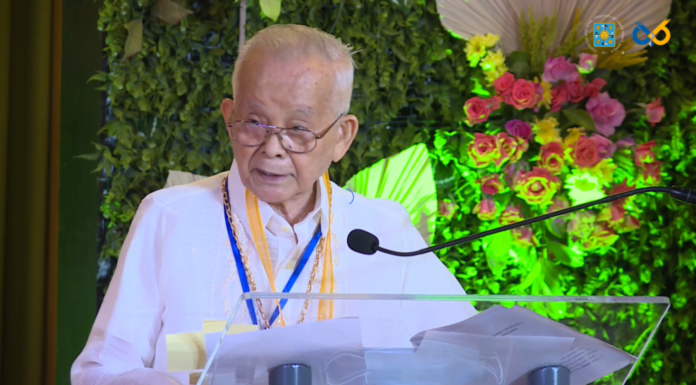 With only a few days left before Paskuhan, the annual Christmas event in UST, ground sweeper Samuel Mustacho Jr. is already gearing up for the “intensive cleaning” that lies ahead. The sheer number of people that will flock to the University on Dec. 19 means that he will need to use every ounce of energy he has to endure the heavy work.
With only a few days left before Paskuhan, the annual Christmas event in UST, ground sweeper Samuel Mustacho Jr. is already gearing up for the “intensive cleaning” that lies ahead. The sheer number of people that will flock to the University on Dec. 19 means that he will need to use every ounce of energy he has to endure the heavy work.
What Thomasians hardly realize is that the field becomes a dump site of sorts after big events like Paskuhan.
“My fellow workers and I usually have to work overtime until cleaning gets done,” Samuel said in Filipino.
However, the 29-year-old Thomasian “metro aide” does not mind the exhaustion whenever he gets the chance to watch the different Paskuhan performances for free, aside from enjoying the free food and drinks.
“I’m happy with the perks of Paskuhan because this does not happen often,” Samuel said.
Sweeping the streets the whole day with hardly any rest is not an ideal job, especially with dried leaves scattered on the ground and garbage littered around the campus.
“I hardly get any rest because I always have to keep sweeping the dried leaves on the ground, not to mention that some students simply dump their garbage everywhere. I can only rest during break time,” he said.
But for Samuel, serving the Thomasian community by getting rid of the trash is a better work description than planting crops in a farm in Surigao City six years ago.
“I left to search for job opportunities in Manila because life in the province was really hard,” he said in Filipino.
The street sweeper has been cleaning the football field for more than two years now.
But despite a stable job in the city, Samuel struggles to survive since his family is away. His wife and two-year-old child are in the former’s province, where she has a neighborhood store. Samuel wards off sadness by calling and visiting them once in a while.
Samuel said that last year, his child was confined in the Philippine Children’s Hospital for two weeks due to a serious lung problem. But luckily, the couple was able to borrow enough money from his fellow workers and relatives to pay for the hospital bills.
“But nothing remained of our savings,” he said.
Samuel starts his nine-hour day shift by cleaning first the areas whose mess is “unpleasant to the eyes” before moving on to the regular cleaning routine.
“I give priority to those areas with obvious trash like scattered papers so that other people would not have to see it,” Samuel said.
With barely a broomstick in hand and a makeshift dustpan out of wood and can cut out of a vegetable oil can, this hard-working man can be seen sweeping along the corners of the field where students can be seen playing, eating, and rehearsing for class presentations everyday.
But the sweeping job could not get any harder if done under the sweltering heat of the sun. He only has his green long-sleeved uniform to shield his skin during his shift that begins at around lunchtime. Samuel’s patience is also tested since the streets never run out of litter.
Samuel simply endures the heat and all the tiresome aspects of his work. “This is the only job I can do,” he said.
“Disciplinary action”
I asked Samuel if I could help him with his “chores,” fairly confident that sweeping the streets did not differ from that of the household.
He would not let me help him at first, fearing that his superior might see him. After all, it seemed inappropriate to let a student like me take over or assist him in his job.
But after a few minutes, he finally let go of his cleaning tools. I got hold of them, brushed a few pieces of dried leaves that scattered along the street behind the grandstand.
“That broom is used for minimal trash,” said Samuel, pertaining to the broomstick I was holding. He then went out to get a bigger one and a yellow waste bin with wheels.
He brushed off the leaves and gathered them in a corner while I shoved them with smaller tools and dumped them inside the wheeled bin. After a few minutes, Samuel had progressed to the other side of the field with such speed.
Meanwhile, students who passed by me gave me strange looks, which made me a bit uneasy, especially when I pulled the bin near the bunch of leaves. They probably thought I was under some disciplinary action.
And it seemed I was really under one when my back started to hurt and my hands turned reddish and coarse. The little broom I used could not push much dirt so I had to exert more effort to shove it to the dustpan.
I also found plastic bottles and snack packs mindlessly dumped around the vicinity even though a garbage bin was nearby.
“Is throwing the trash to the waste bin such a hard thing to do?” I thought, and reflected on the Thomasian value of cleanliness, if ever there was one. But with Samuel always experiencing the same thing everyday, the answer might have been pretty obvious.
“I just keep in mind that I have a family to support that is why I have to work extra hard. It is hard to find other jobs these days,” Samuel said.
Ironically, the Thomasian metro aide cannot stay displeased about the messy nature of his job since without garbage, nothing is left for him to work on. But as long as the University grounds need to be cleaned, Samuel is sure to be of service.
“I can not tell the students what they should and not do because they are big enough to know it already. Besides, if UST is completely clean, I can no longer clean it!” Samuel said.















